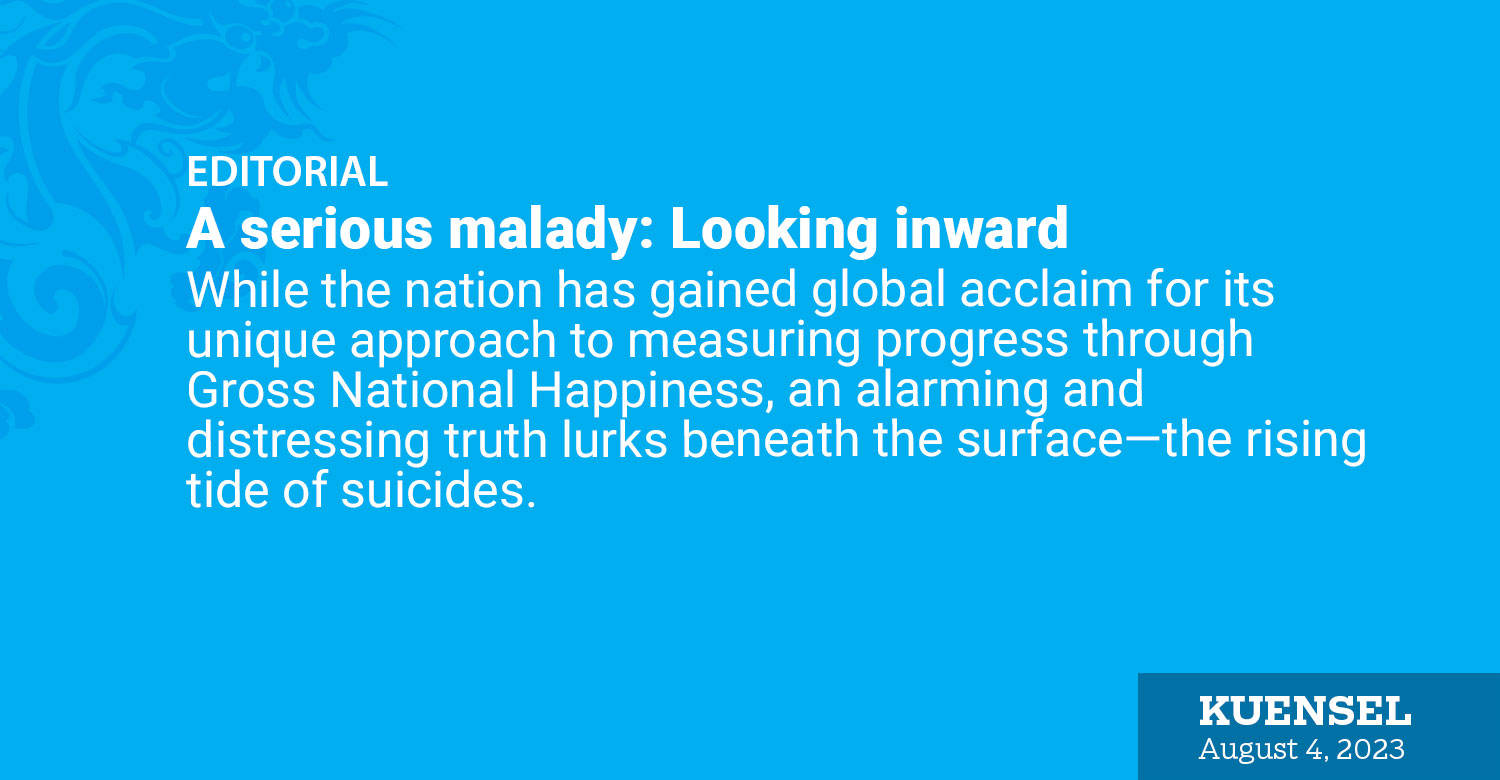While the nation has gained global acclaim for its unique approach to measuring progress through Gross National Happiness, an alarming and distressing truth lurks beneath the surface—the rising tide of suicides.
As the numbers reveal, this crisis demands urgent attention and an unwavering commitment to understanding the underlying causes.
For a country that prides itself on cherishing spiritual and mental well-being, it is indeed a painful and jarring reality that an average of 100 Bhutanese take their own lives every year. As the Royal Bhutan Police records document the grim statistics, the figures are more than mere numbers; they represent lives lost, dreams shattered, and a deepening scar on Bhutan’s collective soul.
The year 2022 witnessed 112 Bhutanese individuals succumbing to the clutches of despair, a devastating surge compared to the previous years. The numbers for 2021, 2020, and 2019 were equally distressing at 100, 105, and 105 suicides, respectively. The downward trend from 2018 with 90 suicides may seem like a glimmer of hope, but it offers no solace in the face of the tragic losses in recent years.
Behind these cold figures lie personal stories of desperation, hopelessness, and anguish. The tragedy is further magnified when we delve into the age brackets affected the most. The report reveals that in 2022, 59 individuals between the ages of 10 to 30 and 53 individuals between the ages of 30 to 85 chose to end their lives. The young and the elderly, the pillars of our society, are equally vulnerable, reminding us that despair knows no bounds of age or station in life.
So, why is this happening in a nation that prides itself on its commitment to happiness and well-being? The answer is not simple, nor can it be addressed through a one-size-fits-all solution. Instead, we must be ready to engage in difficult conversations and foster an environment where mental health is prioritised, destigmatised, and given the attention it deserves.
One crucial factor to consider is the rapid pace of societal change and modernisation. While Bhutan has embraced development, the accompanying challenges have left some citizens feeling disconnected, isolated, and unable to cope with the demands of an ever-changing world. The traditional sense of community and support, once the bedrock of Bhutanese society, is eroding, leaving some individuals feeling adrift and alone.
Moreover, the relentless pursuit of material wealth and comparison with others, driven in part by globalization, has seeped into the collective psyche, leaving many with a sense of inadequacy and worthlessness. The pressure to conform to societal expectations can be suffocating, particularly for the youth who may feel overwhelmed by academic or career pressures, leading them to see suicide as the only escape.
Another critical aspect to explore is the impact of mental health stigma. For too long, mental health issues have been brushed aside, considered a sign of weakness or taboo in Bhutanese culture. This reluctance to talk about and seek help for mental health concerns only perpetuates the cycle of suffering and silence. It is time to break these barriers, educate the population about mental health, and provide accessible and compassionate mental health support services.
A multi-faceted approach is required, combining preventive measures, mental health awareness campaigns, improved access to professional counselling services, and a rekindling of the sense of community and support that once defined Bhutanese society.
We must also recognise that fostering Gross National Happiness goes beyond just economic growth; it is about nurturing the well-being of every Bhutanese citizen, addressing their emotional needs, and ensuring that they find purpose, hope, and belonging in their lives.
Our ancient wisdom, compassion, and resilience are our greatest assets. We have the strength to heal, but it requires an unwavering commitment to destigmatising mental health, to reaching out to those in need, and to fostering an environment where every Bhutanese feels valued and supported.
We must never forget that true happiness lies in our ability to uplift one another, to lend a hand to those in despair, and to show boundless empathy and love.


